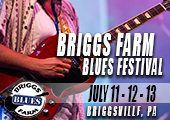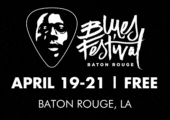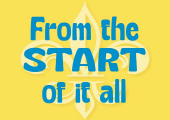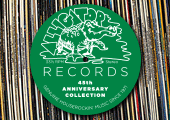FENTON ROBINSON
 Out of Chicago: The Chicago Blues Master—Live and Studio Sessions, 1989/92
Out of Chicago: The Chicago Blues Master—Live and Studio Sessions, 1989/92
JSP Records – JSP 3017
Out of Chicago is a welcome and unexpected set of tracks from the late Chicago guitarist Fenton Robinson. Live numbers from the 1989 Burnley Blues Festival (England) and the 1992 Ecaussinnes Festival (Belgium), are nicely quilted together with four BBC studio tracks for a set just over an hour long.
Known for such well-crafted and classic sides as I Hear Some Blues Downstairs, The Freeze, As the Years Go Passing By, and his signature number, Somebody Loan Me a Dime, the Grammy-nominated (for I Hear Some Blues Downstairs, his 1977 Alligator release) Robinson never fully achieved the success due him before his death at age 62.
For the BBC numbers (first four tracks) and the Burnley ones (two tracks), Robinson was backed by the excellent Norman Beaker Band, an English unit that had done its homework; and for the four Ecaussinnes tracks that close the set, Robinson appeared with a “Chicago band,” perhaps borrowed from Son Seals, who was also on the show and traded licks and vocals with Robinson on those numbers.
Interestingly, the CD opens and closes with different takes of his powerful minor key You Don’t Know What Love Is (which has been covered and frequently played by Chicago bluesman Jimmy Johnson to whom Robinson has drawn comparisons over the years). Robinson clearly displayed a natural affinity for this early masterpiece of his, stretching out comfortably in front of both backing bands for two equally enjoyable listens. It is easy to understand why compiler John Stedman couldn’t choose one over the other.
Standards Just a Little Bit, Help Me, and Stormy Monday are interspersed with Robinson’s own compositions, I Had a True Love, You Say You’re Leaving, plus the instrumental Night Flight and funky Ghetto Train (not the Luther Ingram number). The mellow Goin’ to Chicago is based loosely on the Count Basie number of the same name.
Those who admire the work of Fenton Robinson will not be disappointed: the expert showman balances his warm vocals with plenty of distinctive single-note picking throughout, as well as masterful tension and release in the extended solos, and the jazzy arpeggios which he was wont to explore.
Out of Chicago is indeed a savory adjunct to Fenton Robinson’s relatively slim lifetime catalog of recorded music, and a joy to hear.
—Justin O’Brien
JOE LOUIS WALKER
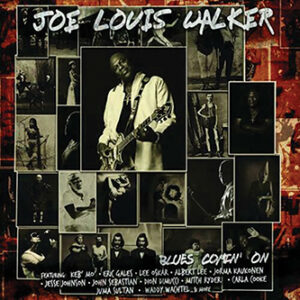 Blues Comin’ On
Blues Comin’ On
Cleopatra Records – CL 01714
Joe Louis Walker continues to expand his horizons on Blues Comin’ On, his third project released for Cleopatra Records. The session brings a wide array of cameo performances, joining a core band of John Bradford on bass, Dorian Randolph on drums, and Juma Sultan on percussion (who historically played at Woodstock with Jimi Hendrix).
Jorma Kaukonen serves up some screaming lead guitar on Feed the Poor, Walker’s tune that was inspired by Mick Jagger’s son Gabriel who originally wrote a poem on the social statement. The swampy title track, Blues Comin’ On, showcases the blazing guitar of Eric Gales, while Someday, Someway features vocalist Carla Cooke who croons over the 6/8 gospel feel that reflects Walker’s church background. War’s legendary harp player Lee Oskar adds tasty bits in between the lyrics.
Walker taps into Minneapolis funk when he takes a page out of Minnesota’s most legendary band (The Time, led by Morris Day) and invents a dance called The Thang. Walker taps the Time’s original guitarist, Jesse Johnson, to lay down the groove and a greasy Hendrix-inspired solo. Jesse quotes the Hendrix riff on Rainy Day, Dream Away from the Electric Ladyland album, while simultaneously conjuring the slow-rolling Manic Depression groove.
Old Time Used to Be has an infectious groove that allows John Sebastian to blow some sweet Big Walter–styled harp, which makes way for Keb’ Mo’ to make an appearance on acoustic guitar for a swingin’ solo of his own. Come Back Home is a soulful arrangement that captures that old-school style that Walker executes effortlessly—the gruff voice of ’60s soul singer and Detroit Wheels legend Mitch Ryder gives the song exactly what it needs. Walker goes old school when he channels Bobby Rush’s 1972 Jewel Records and delivers the sassy lyrics of Bowlegged Woman, Knock-Kneed Man, featuring veteran blues harp night cat Rick Estrin, and guitarist Waddy Wachtel on lead guitar.
Awake Me Shake Me slows things down with sensual bedroom music with Carla Cooke trading lyrics with Walker à la Rick James and Teena Marie. Lonely Weekends, the 1960 country pop tune (originally performed by Charlie Rich) has the multi-instrumentalist David Bromberg playing lead acoustic guitar and Sebastian again on harmonica. Albert Lee provides twangy country rock guitar on Seven More Steps, while the Time drummer Jellybean Johnson provides a blistering guitar solo on Uptown to Harlem (Betty Davis, Miles Davis’ former wife, originally penned the gritty lyrics for the Chambers Brother in 1967.) The psychedelic 7 & 7 Is (written in 1966 by Arthur Lee of the hippie band Love) serves as a trippy closer featuring Arlen Roth’s spacy guitar. It’s a delightfully “far out” way for Joe Louis Walker to send us home on a high.
—Wayne Goins
MACEO PARKER
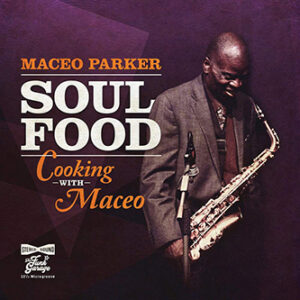 Soul Food: Cooking with Maceo
Soul Food: Cooking with Maceo
Funk Garage–TFG76092
“Maceo, blow your horn!” It’s been decades since James Brown gruffly exhorted Maceo Parker to add his lyrical, punchy alto sax solos to the hits Papa’s Got a Brand New Bag and Cold Sweat. Parker’s sax was also a key ingredient in the boundary-pushing work of George Clinton’s Parliament-Funkadelic. Soul Food: Cooking with Maceo shows that time has not in the least diminished Parker’s musicianship and exuberant spirit. Recorded at New Orleans’ House of 1000hz with Ivan Neville on keyboards, this outing spices up Parker’s signature blend of soul and funk with covers of tunes by Big Easy legends Allen Toussaint, Mac Rebennack, and the Meters.
The Parker original Cross the Track kicks off the proceedings on the right foot. Guitarist Derwin “Big D” Perkins, bassist Tony Hall, and drummer Nikki Glaspie lock into a spandex-tight groove. The horn arrangements by saxophonist Jason Mingledorff are razor sharp, and Parker’s alto sounds as joyful and expressive as ever. Yes We Can Can, a passionate plea for unity from master New Orleans songsmith Allen Toussaint, takes on new meaning in today’s troubled times. Parker may have achieved fame as a saxophonist, but he’s no slouch on vocals. His sense of rhythm is impeccable, and his voice has a ragged warmth that quickly grows on the listener. Neville’s bubbly keyboard riffs perfectly complement Toussaint’s heartfelt lyrics, and trumpeter Ashlin Parker and trombonist Mark Mullins flesh out the arrangement.
Parker digs deeper into the session’s New Orleans vibe with a reading of the Mac Rebennack (a.k.a. Dr. John) warhorse Right Place, Wrong Time. It’s interesting to hear Parker and crew put their spin on a beloved classic. Neville keeps a notably low profile on this track, only contributing a few discrete chords. As a result, the arrangement is driven by horns and the percolating rhythm work of Perkins, Hall, and Glaspie. Parker tackles Rebennack’s hip, tongue-in-cheek lyrics with aplomb, and his sax solo crackles and sparks like a backyard fireworks display.
The seamless mix of soul, funk, and a touch of jazz featured on Soul Food: Cooking with Maceo brims with joy and gives every member of the band a chance to shine. Listeners are bound to find themselves moving along with the groove.
—Jon Kleinman
GERALD McCLENDON
 Can’t Nobody Stop Me Now
Can’t Nobody Stop Me Now
Delta Roots – DR-1003
Chicago’s Gerald McClendon has earned his nickname as the Windy City’s Soul Keeper through years of taking the classic soul of Otis Redding, Wilson Pickett, Marvin Gaye, and their like to venues as varied as Rush Street night spots, suburban supper clubs, and Evanston schools, but until recently has had a surprisingly short discography. There was a single with premier keyboardist Roosevelt Purifoy a couple years back, an album-length collaboration with Mother Blues in 2005, and tracks on Robert Johnson and Aerosmith tribute discs in between. Things began to pick up last year when he collaborated with veteran sax and harmonica player Vince Salerno on Grabbing the Blues by the Horns (Pravda), which mixed covers of songs by Billy Boy Arnold, Harold Burrage, Little Walter, and Little Milton with others from Redding and classic jazz from Milt Jackson and Oliver Nelson. He also contributed one title to Delta Roots’ Battle of the Blues: Chicago vs Oakland CD in 2019. Now, happily, he’s back on that label with this, his first full album under his own name since 1999’s Choose Love for the Sleeping Dog imprint.
As befits an artist rooted in classic soul, Delta Roots’ Twist Turner has provided McClendon with the support of a full band playing “real” instruments, including guitarists Herb Walker, Joe Burba, and Mark Wydra; keyboardists Purifoy, Sumito Ariyoshi, and Brian James; a full horn section; bassist Art Love; and Turner himself on drums. The dozen titles on offer were all penned by Turner, starting with the brassy optimism of the title track before the subject switches to the all-too-usual vagaries of love—the singer variously adopts the role of the man on the town looking for love (Groove on Tonight), the cheating man caught in the act (Where Do We Go from Here and Cut You Once), the reformed cheater (I Started Over), the man victimized by a cheating woman (She Don’t Love Me Anymore and Runnin’ Wild), the man pledging his devotion (You Can’t Take My Love) and even the Jody man trying to get his foot in the door (Mr. Wrong). Whether it’s the churchy piano on You Can’t Take My Love, the guitar solo on It’s Over Now, or Skinny Williams’ gritty tenor sax solos, the band work is impeccable throughout.
Aficionados of classic soul will find much to savor here—McClendon is an unsung master of the art, and he deserves to be more widely known.
—Jim DeKoster
KENNY “BLUES BOSS” WAYNE
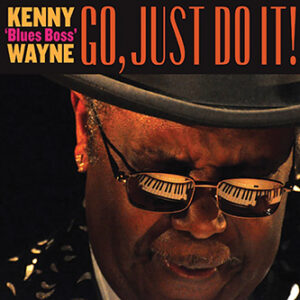 Go, Just Do It!
Go, Just Do It!
Stony Plain – SPCD1413
It seems that songwriter and Boogie Woogie Hall of Famer, pianist Kenny “Blues Boss” Wayne ought to be better known outside Canada, where he has won a JUNO Award, their highest music honor, and several Maple Blues Awards, and even a 2012 Living Blues Award. However, the Spokane, Washington–born pianist has lived in Canada for nearly 40 years and is therefore off the radar of many blues fans in the US.
At 75, Wayne shows no signs of aging, and with releases every three or four years since 1995, Go, Just Do It! appears to be right on schedule. In keeping with much of his previous work, there is an irrepressible spirit to this set of “colorful and stylish songs,” as Wayne himself describes them.
A master of boogie-woogie piano, and eminently conversant with the jazz of New Orleans, Kansas City, and the West Coast, Wayne is also a writer of songs that have strong premises, catchy tunes, and good hooks. In fact, he writes much of his own music, and of the ten originals on this outing, Wayne offers a paean to indolence on the NOLA-inspired Sittin’ in My Rockin’ Chair, sings of his mother’s advice on the funky Just Do It! (in a duet with guest Dawn Tyler Watson), complains of a garrulous gal on Motor Mouth Woman, and on T&P Train 400, he longs to visit “an old honey” he once knew in Texas.
The original tracks share the set with a cover of J.J. Cale’s They Call Me the Breeze, and two of Percy Mayfield’s, namely You’re in For a Big Surprise, with vocalist Diane Schuur guesting, and an interesting and successful take on I Don’t Want to Be the President, showcasing Wayne’s son, Cory Spruell, who makes reference to the upcoming US election in a rap that he’d rather be a race car driver or “rock it with my pops” than be president.
Wayne’s aim is clearly to produce releases that have maximum commercial appeal, while remaining true to himself. He achieves this admirably with plenty of jaunty, pop-leaning pleasers, clean production, guest artists, and a potent pair of horns in Jerry Cook and Vince Mai, who play so crisply and tight that they mimic an entire brass section. There’s a lot to like, but in emphasizing catchiness for crossover appeal, Wayne’s trademark boogie piano seems somewhat downplayed this time around.
—Justin O’Brien
JOHNNY BURGIN WITH SPECIAL GUESTS
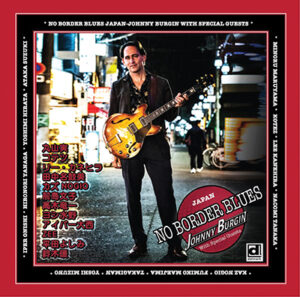 No Border Blues
No Border Blues
Delmark Records – DE 863
Burgin has been touring Japan for over 20 years. During that time, he’s played with many of Japan’s blues musicians, and he gathered here some of his favorite players, as well as some Japanese blues players who have immigrated to Chicago and made a name for themselves with their music.
In the Shibuya district outside Tokyo, for example, Burgin discovers a young harp player named KOTEZ, who turns in a lightning fast version of Little Walter’s I Just Keep Loving Her, which he translated into Japanese as Mada Sukinanda. KOTEZ delivers another scorching performance on his original tune Samurai Harp Attack, which also features guitarist Yoshi Mizuno and harpist Iper Onishi, and drummer Takagiman. Mizuno also plays the scalding runs on the album’s opening track, Carey Bell’s One Day You’re Gonna Get Lucky, Takagiman propels the song at his drums, while Onishi delivers the vocals and burns up the song with harmonica runs. Mizuno lays down the foundation for a slow-burning version of Elmore James’ Sunnyland, which features Onishi again on harp and vocals. Lee Kanehira delivers scampering vocals on her original composition, Pumpkin’s Boogie, with KOTEZ blowing his harp frenetically. The final track offers a twist on the familiar Sweet Home Chicago by reframing it slightly as Sweet Home Osaka.
No Border Blues offers an excellent introduction to some of the best Japanese blues musicians playing today, and we can thank Burgin for gathering them and their musical efforts here in one place.
—Henry L. Carrigan Jr.
ANTHONY GERACI (WITH DENNIS BRENNAN)
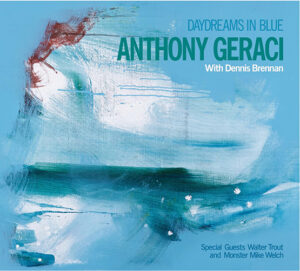 Daydreams in Blue
Daydreams in Blue
Shining Stone Records – SSCD006
Blues veteran Anthony Geraci has called his most recent release, Daydreams in Blue, “the most exciting recording I’ve done under my own name.” It is difficult to argue with him. With a mix of rousing rockers and piano blues, Daydreams in Blue showcases Geraci’s compositional skills and piano brilliance, Dennis Brennan’s assured, soulful, and biting vocals, and the musical synergy of a talented and tight band. With its clean and pristine production, Daydreams in Blue offers listeners explosive lead guitar runs, harmonica blasts, sympathetic woodwind, and brass accompaniment, plus the rhythm section of bassist Michael “Mudcat” Ward and drummer Jeff Armstrong who keep the songs swinging in the right direction.
The lead cut, Love Changes Everything, is a strong beginning and foregrounds the rest of the disc. The song begins with rollicking piano, horns, and Brennan singing about the transcendent nature of love. The song features clipped and tasteful piano and horn solos before Monster Mike Welch dashes off the first of many memorable guitar solos. Welch can be heard throughout Daydreams in Blue, his work most keenly felt on Crazy Blues / Mississippi Woman. A guest appearance by guitarist Walter Trout on No One Hears My Prayers adds more guitar fire to the disc. In his only appearance, Trout tears up the place, his fretwork and emotional tone cuts through the mix and soars above the rest of the band.
While Geraci assembled the perfect cast of musicians to record this disc, Daydreams in Blue is Geraci’s vision, his own compositions. On this 12-song disc, he wrote and arranged all the songs except for Jelly, Jelly and Dead Man’s Shoes. And Geraci’s piano playing is a wonder. He plays many roles—riff maker, accompanist, and soloist—with aplomb. Lyrically, the songs do not stray from common blues topics, while the music has considerable range from the 12-bar blues of Mister to the jazzy instrumental of Ode to Todd, Ella, and Mike Ledbetter, the disc’s closing song. Daydreams in Blue is a recommended purchase.
—Stephen A. King
NEW MOON JELLY ROLL FREEDOM ROCKERS
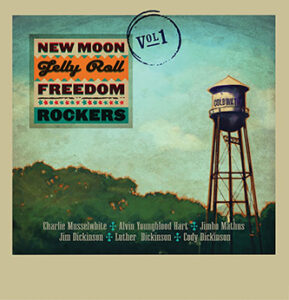 New Moon Jelly Roll Freedom Rockers, Volume 1
New Moon Jelly Roll Freedom Rockers, Volume 1
Stony Plain Records – SPCD-416
On some albums, we can feel the spirit of the musicians in the studio as they jam and lay down the tracks. Their ebullient joy washes over us with the music as it flows out of the speakers and carries us into the presence of the artists making the music. New Moon Jelly Roll Freedom Rockers, Volume 1 is exactly this kind of album. Back in 2007, Luther and Cody Dickinson sat down with ex–Squirrel Nut Zippers leader Jimbo Mathus, blues greats Charlie Musselwhite and Alvin Youngblood Hart, and the late Memphis pianist, producer, and all-around musical stylist Jim Dickinson for a guitar jam that turned into several days of sitting in one big circle at the Zebra Ranch recording studio in Coldwater, Mississippi, playing, taking turns singing, and improvising on the songs that each member of the group brought.
According to Luther Dickinson, the idea for this supergroup emerged when the North Mississippi Allstars were on the road with Musselwhite and Mavis Staples. Dickinson says, “The name of our recording project was born in the back of that ramshackle bus. We had a concept before we had a record. As I explained Alvin Youngblood Hart’s mission to live life as a ‘Freedom Rocker,’ Charlie pointed out the window: there was a new moon that evening. Suddenly, ‘New Moon Freedom Rockers’ materialized (Dad added ‘Jelly Roll’ after the recording session).” When the musicians got together, each one took turns leading and accompanying others through the songs they had brought to what Dickinson describes as a “pot-luck recording party.”
The album opens with Musselwhite’s scorching harp runs and gritty vocals on Blues Why You Worry Me. The song’s a perfect opener since it’s a shake-your-bones, slide-across-the-floor juke joint jumper, with every musician taking a turn driving the tune higher and higher, wrapping tasty guitar licks, rolling piano chords, and propulsive drums around Musselwhite’s harp. Jim Dickinson lays down a funky piano as the foundation of the slithering New Orleans strut Come on Down to My House, and the others join in on a raucous chorus, delivering a romping, seductive party tune. Dickinson’s growling vocals, enfolded in the blazing blues funk of the rest of the musicians, transports Wilbert Harrison’s Let’s Work Together, turning it into a roaring command to work for unity. With Hart taking the lead, the group delivers a version of Jimi Hendrix’s Stone Free that at once pays tribute to Hendrix and goes beyond him by capturing the song’s urgency to be free. Mathus conducts the group through a haunting, ethereal slow burning take of his original tune Night Time, while Musselwhite leads the group through his jump blues tune Strange Land, a song he made up when he was 18 about feeling like a stranger in his new home of Chicago, trying to make it as a musician and not knowing anyone.
New Moon Jelly Roll Freedom Rockers, Volume 1 lays out a musical feast at which we relish every course. By the end, we want more, of course, and Volume 2 is slated for release in spring 2021.
—Henry L. Carrigan Jr.
LARKIN POE
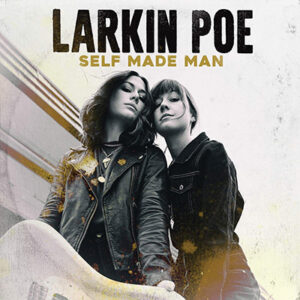 Self Made Man
Self Made Man
Tricki-Woo Records – No #
At this point in their career, some ten years on, sisters Rebecca and Megan Lovell find themselves in the auspicious position of having to measure up to the high bar that they established for themselves early on. Having branded themselves as Larkin Poe in honor of their great-great-great-grandfather, the two women have tallied up a significant number of accomplishments, drawing significant praise in the process. Their third album, Peach, received a nomination for the Blues Foundation’s Best Emerging Artist Album award, while its follow-up, Venom & Faith, not only reached No. 1 on Billboard’s blues chart, but also garnered a nod as a 2020 Grammy Award nominee for Best Contemporary Blues Album. The fact that the two women self-produce their own efforts and occasionally veer away from their day jobs to accompany Elvis Costello, Jackson Browne, Keith Urban, Kristian Bush of Sugarland, and Conor Oberst of Bright Eyes, speaks not only to their dexterity but also an obvious ability to bend their boundaries at will.
Of course, the most apparent evidence of that finesse and flexibility is the album’s gender-defining title, which also serves to enhance and affirm the assertive sound they purvey throughout. The fact that the sisters handle the majority of instrumentation, mostly consisting of resonator guitar, lap steel, electric and acoustic guitars, and synth, provides another indication of both their versatility and veracity. On stand-out songs such as She’s a Self Made Man, the didactic Keep Diggin’, the swampy strutting take on Blind Willie Johnson’s God Moves on the Water, the bluesy and blustery Every Bird That Flies, and the suggestive swagger that accompanies Ex-Con, the duo convey an uncompromising sense of drive and defiance. Oftentimes they simply settle for a sound that finds its entire essence bound up in a fierce stomp, leaving little doubt as to their ominous intents. Even so, the pacing can easily change, given the clip-clop, hand-clapped rhythm that turns Tears of Blue to Gold into a celebratory stroll or finds Scorpion fully fueled as an all-out rocking rampage.
These offerings possess various things in common, mostly a confidence and competence that allows them to fully tend to the tasks at hand. Despite any conjecture conveyed by the title, Larkin Poe can clearly claim not only to be self-made, but fully self-sustained as well.
—Lee Zimmerman
LIBBY RAE WATSON AND BERT DEIVERT
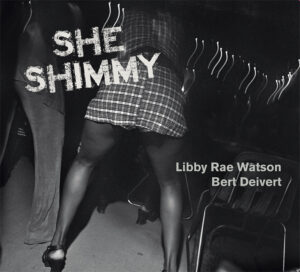 She Shimmy
She Shimmy
Hard Danger Studio – HDCD04
Recorded mostly in Sweden, She Shimmy combines the vocal and instrumental talents of South Mississippi native Libby Rae Watson and New Hampshire–born Bert Deivert (expat living in Sweden) with guest appearances from Eric Bibb, Charlie Musselwhite, and other musical friends. As many blues fans will remember, Watson and Deivert are no newcomers to the blues world. Both cut their teeth on the genre in the 1970s and, in the last 50 years, have collectively played with an impressive list of blues alumni including Sam Chatmon, Honeyboy Edwards, Big Joe Williams, Furry Lewis, Son Thomas, and T-Model Ford. She Shimmy is the debut collaboration between the two musicians; blues fans who appreciate down-home Mississippi blues complete with evocative storytelling and a range of instrumentation, including the mandolin and fiddle, will find much to appreciate about She Shimmy.
Mutual collaboration and genuine respect between Watson and Deivert make She Shimmy such an enjoyable and satisfying listen. Their musical union goes beyond their deep appreciation of country blues, Mississippi, or groups that inspired them, including the famed Mississippi Sheiks. It goes to how the two play together in such harmony that each song brings out the best in the other, avoiding potential competitive missteps along the way. There is the call-and-response in I Want You to Know as the two trade roles and lead vocals. And it is songs like Ashtray Taxi and That’s All Right where Watson’s rhythm guitar is accompanied by Deivert’s excellent mandolin work. This musical synergy can be found throughout the disc’s assortment of cover songs, ranging from Sam Chatmon’s Ashtray Taxi to the disc’s closing song, George “Little Hat” Jones’ Bye Bye Baby Blues.
Watson wrote three compositions including the title song, I Won’t Cry, and Big Joe. Featuring the interplay of guitar, mandolin, and harmonica (Bill Steber), the title song references the Delta (Clarksdale) and the Hill Country (e.g., Otha Turner) in a story about a woman who “shimmies” and “wobbles . . . until the break of dawn.” A song about the aftermath of a failed romance, I Won’t Cry features Watson’s determined voice, an irresistible and hypnotizing riff, and Deivert’s excellent bottleneck work. Big Joe is a story of Big Joe Williams and Watson’s 1978 trip to Crawford, Mississippi, to find the legendary blues musician. Watson talks-sings through the tale: “We drove on down to his automobile / There he was sitting up behind the wheel / Well, I knew it was him / You ask me how I’d know? / He had a bright red shirt and it said ‘Big Joe’/ When he opened his mouth he sang, ‘Well, baby, please don’t go’.” Deivert’s song, Cuckoo Crowed, utilizes a similar riff found in I Won’t Cry and tells a story of travel and regret featuring Eva Deivert’s fiddle work.
While Watson and Deivert’s songwriting is excellent, She Shimmy’s best songs are Mason Arnold’s compositions Blue Steel and Bluesman in My Graveyard. With Watson on lead vocals, there is a haunting quality to these songs that deserves repeated listens. Propelled by Watson’s rhythm guitar, Blue Steel is enhanced by Deivert’s mandolin and bottleneck accompaniment with Musselwhite’s tasteful and supportive harmonica work. Bluesman in My Graveyard is Watson’s best vocal and guitar performance on She Shimmy. Aside from Darkness on the Delta, every song on She Shimmy is a winner, and this outing makes a strong argument for future collaboration between the two gifted musicians.
—Stephen A. King


